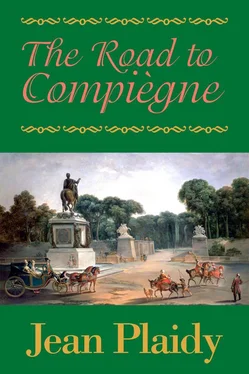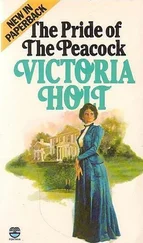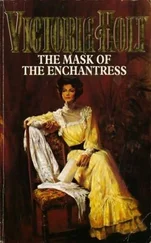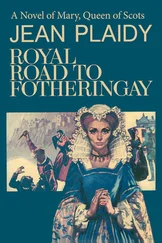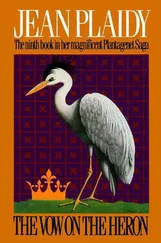And Choiseul? He would remain his enemy.
‘Go to your apartments and rest,’ the King had said. Rest! With Choiseul ready for revenge?
The next day, after a restless night, Le Bel had a stroke. He lived only for a few hours.
He died of shock, said the Court. The shock of seeing the ex-grisette whom he had brought to the trébuchet , about to fill the place of Madame de Pompadour.
* * *
Meanwhile Jean Baptiste lost no time in bringing to Paris his unmarried brother, the Chevalier Guillaume du Barry, that a marriage might take place between him and Mademoiselle de Vaubarnier (Jean Baptiste had added the de to her name by this time).
The Chevalier Guillaume was far from unwilling. He was promised that he would be amply rewarded for his services, and he was glad of any excitement which would take him away, if only temporarily, from the tumbledown old château in Lévignac where he and his sisters lived under the despotic rule of their mother.
Jean Baptiste was delighted with the way his plans were working out. The King’s demand that Jeanne should be married pointed to one fact: Louis had evidently decided that Jeanne was to be received at Court, and this was tantamount to recognising her as maîtresse-en-titre .
Jeanne was being prepared to follow in the footprints of Madame de Pompadour, which to all earnest observers were still visibly leading from the valleys of obscurity to the summit of power.
Determined that his interests should not be forgotten he brought from Lévignac to Paris, with his brother Guillaume, his sister, Fanchon, so that she might become Jeanne’s companion at Court and thus look after the interests of the family.
Fanchon was middle-aged, slightly lame but shrewd; and she had a great affection for her adventurous brother and was very grateful to him for rescuing her from the dreary life at the family château .
Jean Baptiste then busied himself with providing a forged birth certificate for Jeanne, in which he not only described her as the legitimate daughter of Jean-Jacques Gomard de Vaubarnier but deducted a few years from her age. Jeanne was twenty-five, which was not really very young, so he would make her out to be twenty-two.
As for the Chevalier Guillaume, he became the ‘ Haut et puissant Seigneur, Messire Guillaume, Comte du Barry, Capitaine des Troupes Détachées de la Marine ’.
‘Everybody,’ said Jean Baptiste, ‘is now happy.’
Guillaume could return home amply rewarded, Fanchon would have a place at Court, and Jeanne need have no qualms about masquerading under a false name as she was now in truth, Madame du Barry. The King was delighted, because he need no longer concern himself with this little point of etiquette and could enjoy the company of his mistress in peace.
But there were many who were far from content. And chief of these was, of course, Choiseul.
Chapter XVIII
THE PRESENTATION OF MADAME DU BARRY
Richelieu was watching events closely. He was an old man, but as in his love affairs he continued with zest, so it was in his political ambitions.
Choiseul was a fool. Pride was his vulnerable spot and it would bring him to disaster, prophesied Richelieu. He had declared himself against the new mistress from the beginning and he would not change his attitude towards her. If he had been a wise man he would at least have pretended to do this.
The King was deeply enamoured, and Choiseul was fully aware how strong had been his attachment to Madame de Pompadour. He should consider: this woman was young and healthy; the King was old and prone to melancholy. Madame du Barry had the same chance as Pompadour had had of keeping her place.
It was the ambition of every man at Court to provide the King with a mistress who would be a friend and not forget her sponsor. Therefore a wise man, who had been unable to provide the King with a mistress, would seek to make himself the friend of the woman whom someone else had procured.
Thus the Duc de Richelieu made up his mind that he would become the friend of Madame du Barry. Not only that, he would gather together certain of his friends and they would stand by her; their object being to oust Choiseul and his friends from the positions they occupied, and take them themselves.
He discussed this matter with his nephew, the Duc d’Aiguillon who, realising that this would mean great political advancement for himself, considered it an excellent idea.
‘Our first duty,’ said Richelieu, ‘is to show ourselves agreeable to the favourite. Not too agreeable, you understand. Distantly so. But we are eager to be her friend. We sympathise with her against the churlish Choiseul. We will sound Vauguyon. You know how he loathes Choiseul and longs to see him dismissed.’
The Duc d’Aiguillon agreed, and the campaign began.
It was not difficult to make friends with Madame du Barry, because she was ready to bestow her smiles on any who asked for them and, being delighted with the manner in which her life was going, she bore no rancour towards anyone. She had even tried to soothe the fury of the Duc de Choiseul.
He had been quite insulting. ‘Madame,’ he had said, ‘it is useless for you try your wiles on me. My friends are ladies.’
She was temporarily angry; then she shrugged aside her anger. ‘Poor old Duc,’ she said to Fanchon, ‘he is worried about me, is he not?’
Fanchon advised caution, but Jeanne was not by nature cautious; and Fanchon was mollified to some extent by the friendly overtures of Richelieu and the Duc d’Aiguillon.
‘Not,’ said Fanchon, ‘that we do not understand the motive behind this show of friendship. But friends, no matter how they come, are welcome.’
* * *
Richelieu, on his way to the King’s Chapel, saw the Duc de Choiseul ahead of him.
The rain had started to come down heavily and Richelieu, who had suspected a sudden shower, had armed himself with an umbrella. Choiseul who was not similarly provided was caught in the downpour.
Richelieu drew level with Choiseul.
‘Allow me,’ he said, his eyes gleaming, ‘to offer you the shelter of my umbrella.’
Choiseul surveyed Richelieu with that air of amused tolerance he often showed towards those whom he suspected of being his enemies, and who – so he wished to convey – worried him no more than a fly buzzing about him.
‘That is good of you,’ he murmured.
As together they walked towards the chapel several people noticed them, and both were aware of the amused glances.
‘What do they think?’ murmured Choiseul, ‘seeing us two thus linked together?’
‘They think we are two heads under one bonnet?’
‘Ah,’ said Choiseul, ‘I have heard it said that two heads can be better than one.’
‘I am sure,’ answered Richelieu, ‘that there is truth in that statement.’
They entered the chapel and attended the service.
When they came out the sun was shining and many courtiers kept within earshot of the two Ducs because the affair of the umbrella had been astonishing and it was believed that it could only mean a rapprochement between these two rivals.
If Richelieu joined forces with Choiseul and they stood together against Madame du Barry, even adored as she was by the King, she would have a very stormy passage ahead of her.
Richelieu gave the Duc his sly smile. Choiseul responded. His voice rang out clearly: ‘I am grateful to you for keeping me dry. Now the weather is fair, and I need not sue for further favours. And my way does not lie in the same direction as yours.’
Richelieu replied: ‘You are right, Monsieur de Choiseul, the weather is fair indeed, and therefore you do not need the protection I can offer. Should it change however, you may depend upon me. I am your good friend.’
Читать дальше
